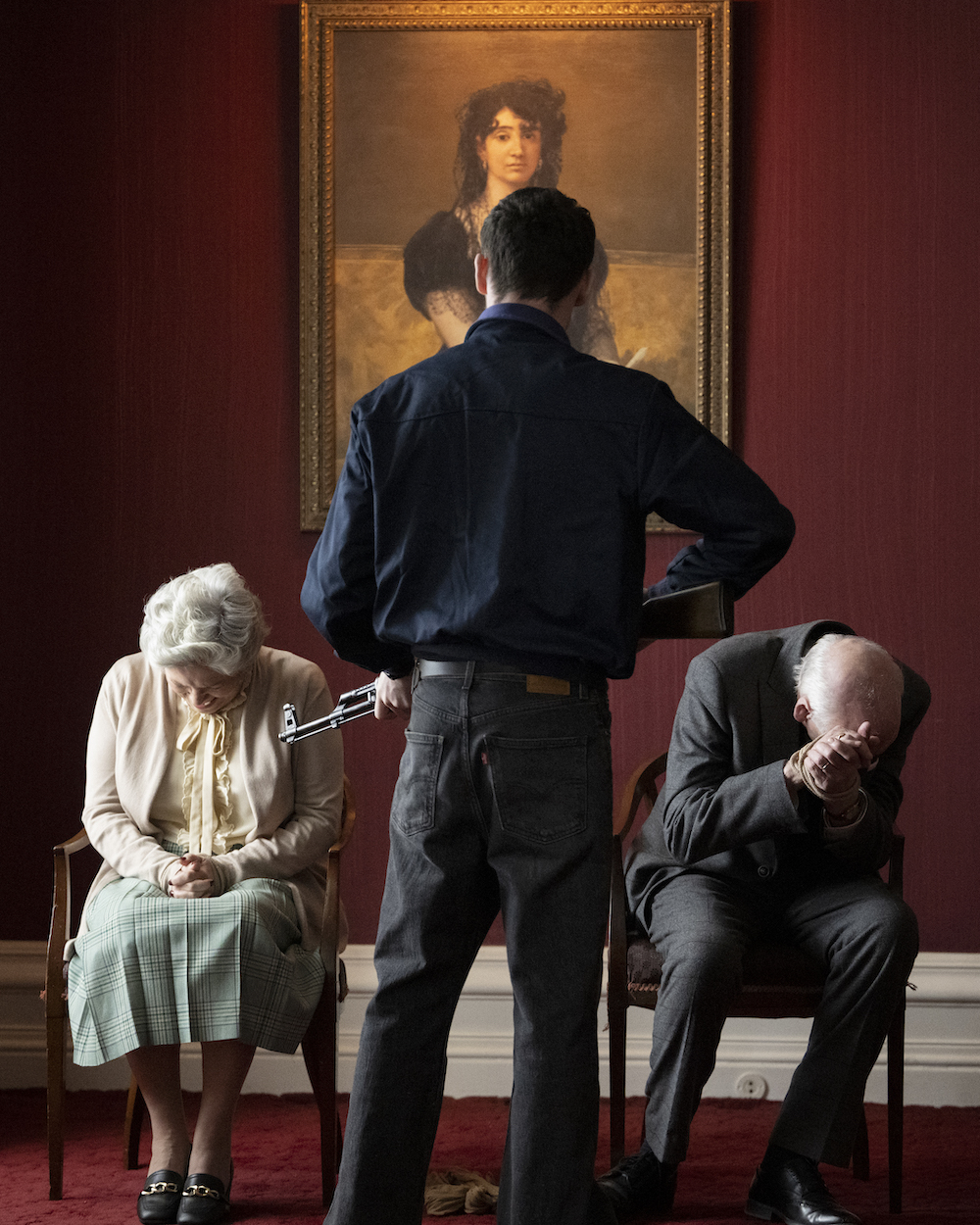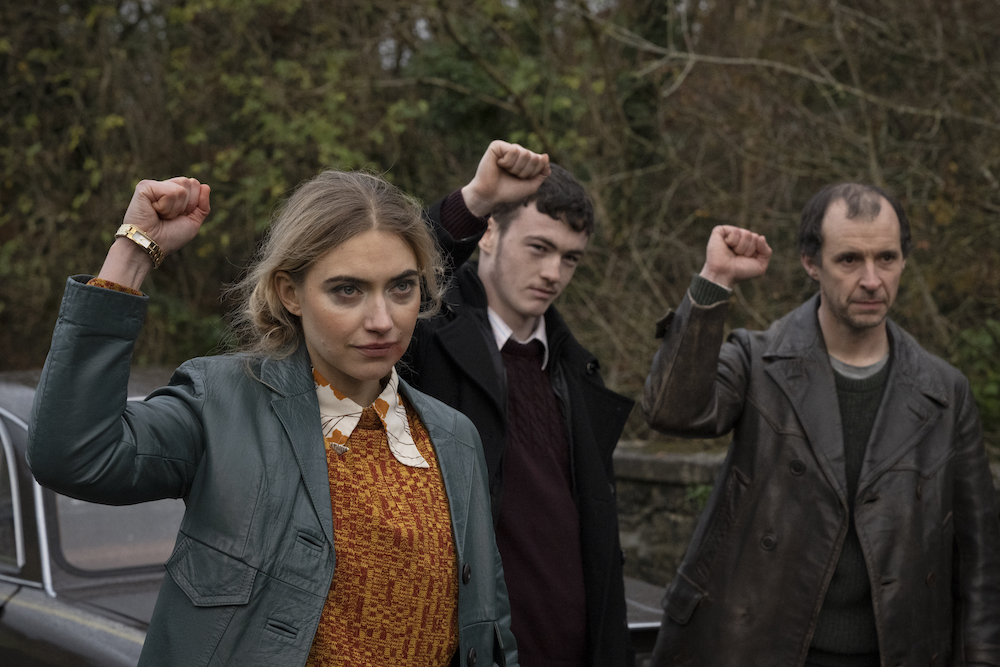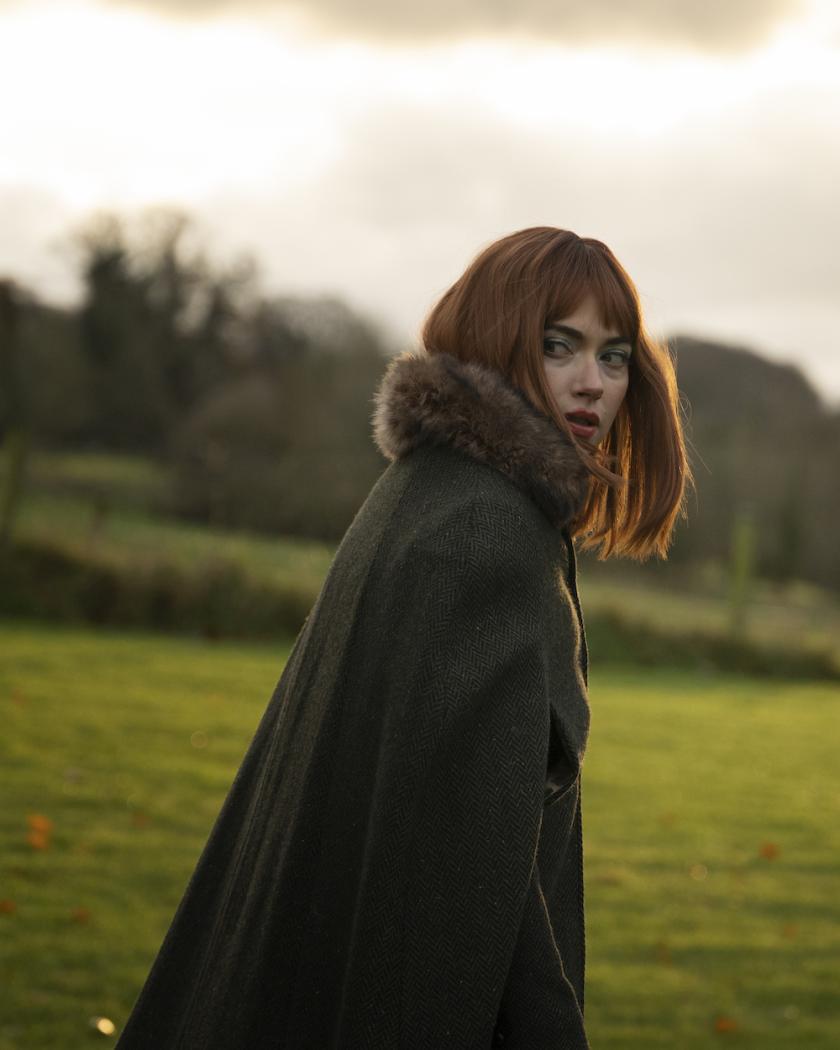“Poor fox,” says Rose Dugdale. She is standing beside her very rich mama and papa in the grounds of their stately home, her face blooded after the killing of her first fox. She knows this vicious upper-class ritual is wrong. It’s 1951 and she is 10. Hardcore challenges to the British establishment lie ahead.
Baltimore, directed by Irish husband-and-wife team Christine Molloy and Joe Lawlor (Rose Plays Julie; The Future Tense), is based on real events, though it’s certainly not a biopic (The Heiress and the Heist, a fascinating documentary series about Dugdale, was released last year).
Dugdale’s story (she died this week, aged 83, in a Dublin nursing home, unrepentent to the end) is an extraordinary one, but the film’s dreamy atmosphere, with flashbacks inserted haphazardly, has a lateral, fragmented feel that doesn’t serve it very well. Even the title is elliptical. And Imogen Poots’s Dugdale, though compelling, has a romantic, misty-eyed vulnerability that makes her militant fervour seem a little ridiculous (she's played as a child by Jude McClean). But perhaps that vulnerability was indeed an essential part of her character. And perhaps certain elements in the IRA did find her ridiculous. Baltimore is set partly in county Wicklow where, in 1974, Dugdale and three IRA accomplices carried out the biggest art heist in history. They stole 19 Old Masters worth millions of pounds including a Vermeer, a Rubens, a Velázquez and a Goya from Russborough House, the home of Sir Alfred Beit (John Kavanagh) and his wife (Andrea Irvine; pictured above), who they tied up, gagged and pistol-whipped. Their aim was to raise money for the IRA through ransom and to demand the release of IRA prisoners, including the Price sisters, from English prisons.
Baltimore is set partly in county Wicklow where, in 1974, Dugdale and three IRA accomplices carried out the biggest art heist in history. They stole 19 Old Masters worth millions of pounds including a Vermeer, a Rubens, a Velázquez and a Goya from Russborough House, the home of Sir Alfred Beit (John Kavanagh) and his wife (Andrea Irvine; pictured above), who they tied up, gagged and pistol-whipped. Their aim was to raise money for the IRA through ransom and to demand the release of IRA prisoners, including the Price sisters, from English prisons.
“Where does all this anger come from, I wonder?” asks her father (Simon Coury) when 17-year-old Rose says she doesn’t want to be presented at Buckingham Palace or come out as a debutante, a process that she deems, sensibly enough, to be a “pornographic affair”. And although the answer to the question may seem obvious in some ways, the film doesn’t follow her development as a political being – or explain how she came to be accepted, as a posh English woman, by the notoriously suspicious and xenophobic IRA – other than in stylised vignettes.
To be fair, it focuses on the heist and its chaotic aftermath, rather than Dugdale’s inner motivations. But we do see her at St Anne’s, Oxford, where she got a degreee in PPE (and later an MA in philosophy in the USA), shouting “Down with the patriarchy,” along with some other nice gals in tweed suits and cardies, then infiltrating the men-only Oxford Union debating society with a friend, wearing men’s clothes and wigs. In a cartoonishly unreal north London squat in 1972, her radicalisation is underpinned by the horror of Bloody Sunday. She weeps as she watches the news.
The 1974 heist isn’t Rose’s first: the year before, she and Walter Heaton, her lover, who was a low-level criminal as well as a civil rights activist (Baltimore makes him Black, which he wasn’t) attempt to rob the Dugdale family seat in Devon. Walter drops a silver platter and the parents appear, the police are called and – the class system at work – Rose gets off with a suspended sentence while he goes to prison for six years. “I love you, daddy, but I hate everything you stand for,” says Rose in court.
 At Russborough, things get nastier, though there's still an amateurish tinge to proceedings. Rose adopts an unconvincing French accent as cover and wears an auburn wig. But her companions, Dominic (Tom Vaughan-Lawlor) and Martin (Lewis Brophy) – they were never identified or caught in real life - are brutal, especially naive young Martin (pictured above, centre, with Poots and Vaughan-Lawlor). A little boy, the son of the butler, witnesses his father being badly beaten. Sir Alfred and Lady Beit are tied up, bleeding, beaten round the head with assault rifles. There are shouts of “capitalist pigs”. Rose gives orders about which masterpieces to take. Her lover Eddie Gallagher (Jack Meade), meanwhile, goes to a safe house in Baltimore - not in Maryland, the one in west Cork.
At Russborough, things get nastier, though there's still an amateurish tinge to proceedings. Rose adopts an unconvincing French accent as cover and wears an auburn wig. But her companions, Dominic (Tom Vaughan-Lawlor) and Martin (Lewis Brophy) – they were never identified or caught in real life - are brutal, especially naive young Martin (pictured above, centre, with Poots and Vaughan-Lawlor). A little boy, the son of the butler, witnesses his father being badly beaten. Sir Alfred and Lady Beit are tied up, bleeding, beaten round the head with assault rifles. There are shouts of “capitalist pigs”. Rose gives orders about which masterpieces to take. Her lover Eddie Gallagher (Jack Meade), meanwhile, goes to a safe house in Baltimore - not in Maryland, the one in west Cork.
The strongest scenes feature Rose, Dominic and Martin hanging out nervously and communing with the paintings in a cottage in remote Glandore, also in west Cork, that Rose, pregnant with Eddie’s child – she hasn’t told him yet – has rented under the name of Ms Merrimée. Martin, it’s obvious, is keen on Rose and may become a liability. Dominic has a dry sense of humour when trying to keep him out of trouble.
They attempt to keep out of sight of the neighbours, which, in a close-knit Irish community, is doomed to failure. The village shopkeeper (the excellent Fionnuala Murphy) is curious as to what Ms Merrimée is doing. Writing a book, says Rose hesitantly. A novel, though she doesn’t want to talk about the plot. “My husband, he’s not so keen on the books, but I quite like them,” says the shopkeeper, with a twinkle in her eye. But does she harbour suspicions about Ms Merrimée and the phone calls she's making?
Rose becomes more and more convinced that they’re being watched, especially when the kindly farmer, Donal (the brilliant Dermot Crowley; Luther) brings over some eggs and she uses her French accent on him by mistake. Oops. She visits him to explain it away and finds him listening to news bulletins about the heist on the radio. Will she be forced to shoot him? She starts having nightmares. Talking to her baby brings some comfort, but she’s full of paranoia and doubt, underlined by Stephen McKeon’s insistent score. She asks Dominic and Martin to dig a grave and tells them to join Eddie in the safe house. “I’d like to come back here for a holiday,” muses Martin hopelessly. “Go for picnics and swims.” The denouement, with the Garda advancing on Rose, is as surreal and discomforting as the rest of the film.















Add comment